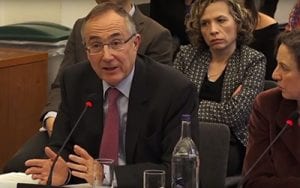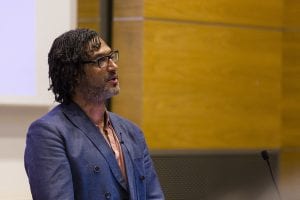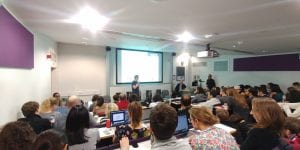On 25 January, the Education Select Committee held the second Oral Evidence Session of its inquiry on the effect of Brexit on higher education (HE) at UCL.
The committee heard evidence from UCL President & Provost Professor Michael Arthur, NUS Vice-President (Higher Education) Sorana Vieru and representatives of University and College Union, Erasmus Student Network UK, Universities UK, the British Council and London Economics.
There was a strong consensus on the potentially damaging effects of Brexit on HE, and an urgent call for the government to do more to address them.

Professor Michael Arthur
The hearing took place just over a week after Theresa May’s historic speech on the UK’s strategy for exiting the European Union, and evidence was heard in two panels.
The Chair of the Education Committee, Neil Carmichael MP, began each session by asking the panellists for their reaction to the Prime Minister’s speech.
Every one of the panellists welcomed the tone of the speech and its emphasis on a “global Britain”, but called for immediate action and more specific detail – particularly in regard to the rights of EU citizens to remain in the UK.
Referring to the Prime Minister’s expressed wish to guarantee the rights of EU citizens, Professor Arthur said: “I’d like to challenge the Prime Minister to go one step further and take the initiative to make the guarantee and challenge the rest of the EU to follow”, arguing that this would give Britain the moral high-ground and provide the negotiations a foundation of good will.
The committee heard evidence of the significant contribution of the higher education sector to the British economy, including the contributions EU staff and students make to the wider economy when they are residing here.
Dr Gavan Conlon (London Economics) also argued that, with education the UK’s fifth largest services export, the HE sector can generate revenue that could contribute to the government’s Industrial Strategy.
The panellists spoke of the positive contributions that EU staff and students make in terms of diversity and ‘soft power’, contributing to Britain’s prestigious academic profile and giving their British peers invaluable experience in international engagement, leadership and collective problem solving. “For a global Britain we need global graduates”, said Rosie Birchard (Erasmus Student Network UK).
The committee also heard evidence that currently UK HE “punches well above its weight” globally – thanks, in part, to our membership of the EU. Jo Beall (British Council) pointed to statistics showing that the UK leads the world in research quality (by field-weighted citation impact) and 1 in 10 world leaders were educated here.
(more…)
Filed under Arts and Humanities, Brain Sciences, Built Environment, Engineering, Enterprise, Global, Laws, Life Sciences, Maths and Physical Sciences, Medical Sciences, Population Health Sciences, Social & Historical Sciences, Student life
Tags: Brexit, education, education select committee, EU, EUreferendum, higher education, Parliament, research, UCL
No Comments »

 Close
Close




